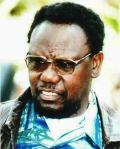The Independent Newsweekly
| National
Catholic Reporter
The Independent Newsweekly |
| Global Perspective |
| June 29, 2004 |
Vol. 2, No. 11
|

Joseph Adero Ngala is an African journalist based in Kenya. In 1995 he won the German Shalom Prize for reporting in Rwanda and Sudan. "Our black brother from the USA is coming. Please bring food with you, we are starving. We need more food, medicine and protection." |
Putting Pressure on SudanBy Joseph Adero Ngala NAIROBI, Kenya -- With so much conspicuous and compelling evidence of humanitarian crisis in Darfur, with visits to the region from U.S. Secretary of State Colin Powell today and tomorrow followed by U.N. Secretary General Kofi Annan, with a powerful and growing chorus of voices declaring that the vast human destruction in Darfur is in fact genocide, why does the National Islamic Front regime continue it impede humanitarian access? Why does the regime refuse to rein in the Janjaweed militias that have been allies in so much destruction? Why does the regime continue with its preposterous claims and denials? This regime is given to brazen remarks and actions. An Egyptian daily reported that Sudanese President Omar el-Beshir has accused unnamed "foreigners" of trying to take advantage of the crisis in the western region of Darfur to intervene in Sudan's affairs. "Foreign circles" the president said, are aware of the healthy peace process in southern Sudan and so "are trying to find a substitute gate in Darfur to intervene in Sudanese affairs." After more than 20 years of fighting, the Islamic Khartoum government is poised to sign a peace treaty with insurgents in the mostly Christian southern region of the country. However, sources in the Catholic bishops' conference of Sudan said that the government's support of the Janjaweed in Darfur is jeopardizing the prospects for a treaty. The U.S. State Department has delivered a similar message to Khartoum. Charles Snyder, the deputy assistant for Africa affairs, has said that continued instability in Darfur caused by the government's encouraging Arab militias to brutalize the Africa populations in Darfur will "fatally complicate efforts to implement a north-south accord." The United Nations and other aid agencies have said hundreds of thousands will die from famine and disease if Sudan fails to allow greater access to the area and rein in the marauding Janjaweed. The Associated Press reported that Sen. Sam Brownback of Kansas and Rep. Frank Wolf of Virginia arrived in the capital Khartoum early last week and traveled to Darfur June 27 to survey the humanitarian crisis. A delegation of British members of parliament arrived in Sudan June 28 for a seven-day visit. So international pressure is building. Four pickup trucks carrying dozens of militiamen raced around the area as the U.S. delegation toured a camp in Darfur, according to the AP. One thing is certain. The scenes Powell will see - if permitted - are horrifying. Powell will see his black brothers and sisters with only the clothes on their backs. Without food or shelter. Childern sick and starving. According to Oxfam, in one camp, over 2,000 people are without toilets; instead people are using areas close to the camp. With seasonal rains beginning, human waste will wash into the camps increasing the risk of disease and epidemics. Powell will see the evidence of brutality: whole villages destroyed, homes razed -- more than 56,000 by some reckonings, and crops destroyed. In large expanses, nothing remains but dogs roaming aimlessly. At a media briefing June 28, U.N. spokesman Stephane Dujarric said that although Sudan has significantly improved cooperation with international relief agencies in recent weeks, there are continuing delays and problems in registering these organizations and their workers and in clearing equipment and aid supplies from customs. "Procedures remain bureaucratic and inconsistent and some delays continue to be reported," he said. Mr. Dujarric said about 20 relief agencies are already operating in Darfur and another 10 are preparing to work there as well. The Washington Post reported that the Sudanese government dispatched 500 men last week to the camps Powell and Annan will visit. The men, some dressed in civilian clothes, others in military uniforms, warned the refugees to keep quiet about their experiences. But one woman, on hearing of the high level visitors, sat down under a tree and cried. She said: "Our black brother from the USA is coming. Please bring food with you, we are starving. We need more food, medicine and protection." Joseph Adero Ngala wrote about the crisis in Sudan for NCR in April: Is Sudan another genocide in the making? |
| Copyright
© 2004 The National Catholic Reporter Publishing Company, 115
E. Armour Blvd., Kansas City, MO 64111
TEL: 1-816-531-0538 FAX: 1-816-968-2280 |